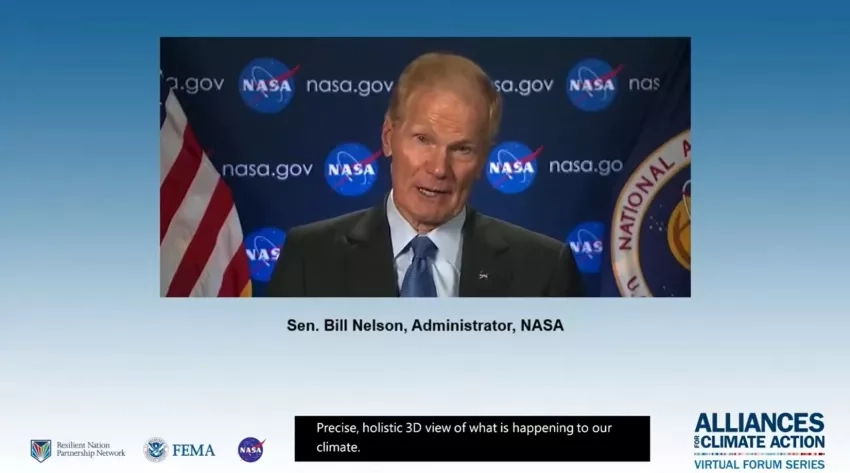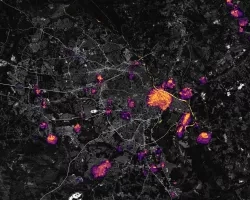NASA’s Earth Science Applied Sciences Disasters program area focuses on a comprehensive range of disasters. More and more of these, such as hurricanes and wildfires, are occurring with increasing frequency and intensity as our climate changes. Each year, the reality of climate change becomes unavoidable for a growing number of populations around the globe. The Disasters program aids national and international communities with accessible space-based Earth observations, which are crucial toward reducing risk and strengthening resilience.
The drive to understand climate change and its effects on society permeates NASA. The agency recently partnered with the Federal Emergency Management Agency (FEMA) to co-host the “Alliances for Climate Action” virtual series, part of the 6th Annual Partnership Forum hosted by FEMA’s Resilient Nation Partnership Network (RNPN). As the largest federally-hosted climate event in several years, the series positioned participating agencies as committed, visible leaders on climate change to an incredibly diverse audience. The virtual forum featured a distinguished panel of 37 thought leaders. Seven federal agencies and 31 organizations participated, as well as officials from Puerto Rico, NGOs, academia, city mayors, a faith leader, and many more. With over 300 unique organizations registered and 3,250 participants, the series prioritized a vast range of perspectives and backgrounds.
FEMA's Partnership Lead, Bradley Dean, who played a crucial role in producing and hosting the event, explains the necessity of working together, "When it comes to climate change and natural hazards, there is a shared responsibility. The efforts of the Resilient Nation Partnership Network work to foster relationships across the whole community, ensuring we are driving collective action. Partnerships are absolutely essential."
A central theme was made clear throughout the series: real climate action is made possible through partnership and informed by scientific research. NASA Administrator, Senator Bill Nelson, joined FEMA Administrator, Deanne Criswell to open the series in a session called “Our Future Vision.” Nelson reflected on the fragility of our home planet and why climate action continues to remain one of NASA’s top priorities. As he shared NASA’s vision for the future, Nelson described the need for a “mission control center for climate change,” or central hub for Earth observations and climate measurements, able to provide real-time climate monitoring in one place. Climate scientists throughout the series explained that improving our understanding of the climate and its dynamics is a necessary step towards response and mitigation and noted that Earth observations are crucial to this process.
Gavin Schmidt, NASA senior advisor on climate, spoke on a panel during the same session, describing the many satellites and continuous, quick-updating systems that NASA uses to provide a wealth of data in order to make these Earth observations possible and, as a result, make actionable science and applied research feasible. Scientists and engineers can then develop models with predictive capabilities, ultimately delivering actionable information that leaders and decision-makers employ when responding to and mitigating climate change. The series focused on each essential factor to these goals, including finances. Sandra Cauffman, deputy director of the NASA’s Earth Science division, spoke on “Financing Climate Action,” emphasizing that action—not just discussion—is the true objective, and that no one institution alone can solve the climate crisis. Unity in shared recognition is necessary to combat the issue of climate change, and virtual events like the RNPN forum encourage the collaboration and discussion required to establish partnerships and take effective action.
With freely available tools such as NASA’s Eyes on the Earth, you can track Earth science satellites in real time as they orbit our planet and explore the trove of information they provide. Credit: NASA/JPL-Caltech
NASA’s Disasters program plays an essential role in furthering the actionable goals put forth in this year's forum, such as fostering partnerships and increasing community collaboration through highly accessible Earth observation data. The program reflects NASA's focus on translating science and research to the community level, where all leaders can take action to protect and benefit society in the face of a changing climate.
Shanna McClain, who serves as NASA's Earth Sciences global partnerships manager and advises the agency’s Applied Sciences program on risk reduction and resilience, summarizes: "NASA's goal is to deliver actionable science. For communities building resilience to climate change, that means science-based information that will help them plan for, mitigate, and respond to climate extremes. No other scientific agency has the end-to-end capability to acquire, launch and operate Earth observation satellites from space - and conduct the scientific research to turn that collection of data into actionable science."
Videos of each event in the “Alliances for Climate Action” virtual series are available to watch here.




